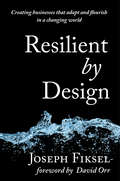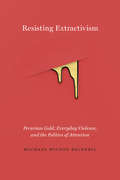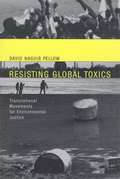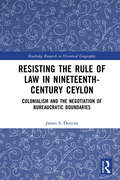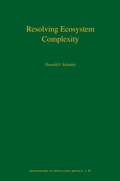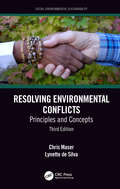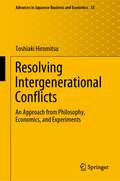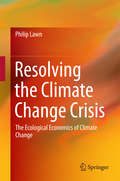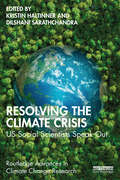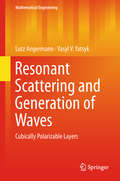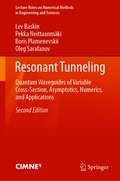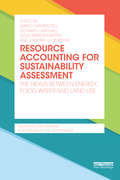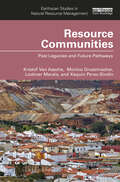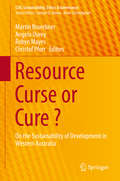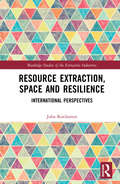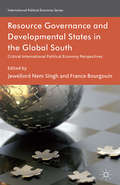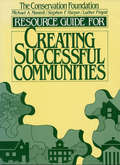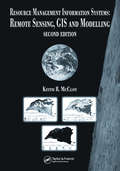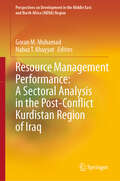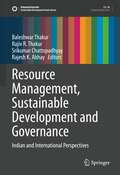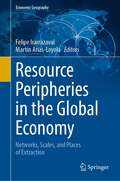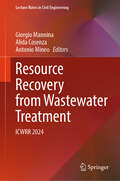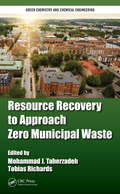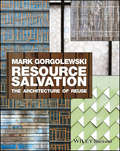- Table View
- List View
Resilient by Design: Creating Businesses That Adapt and Flourish in a Changing World
by Joseph FikselAs managers grapple with the challenges of climate change and volatility in a hyper-connected, global economy, they are paying increasing attention to their organization's resilience--its capacity to survive, adapt, and flourish in the face of turbulent change. Sudden natural disasters and unforeseen supply chain disruptions are increasingly common in the new normal. Pursuing business as usual is no longer viable, and many companies are unaware of how fragile they really are. To cope with these challenges, management needs a new paradigm that takes an integrated view of the built environment, the ecosystems, and the social fabric in which their businesses operate. Resilient by Design provides business executives with a comprehensive approach to achieving consistent success in a changing world. Rich with examples and case studies of organizations that are designing resilience into their business processes, it explains how to connect with important external systems--stakeholders, communities, infrastructure, supply chains, and natural resources--and create innovative, dynamic organizations that survive and prosper under any circumstances. Resilient enterprises continue to grow and evolve in order to meet the needs and expectations of their shareholders and stakeholders. They adapt successfully to turbulence by anticipating disruptive changes, recognizing new business opportunities, building strong relationships, and designing resilient assets, products, and processes. Written by one of the leading experts in enterprise resilience and sustainability, Resilient by Design offers a confident path forward in a world that is increasingly less certain.
Resisting Extractivism: Peruvian Gold, Everyday Violence, and the Politics of Attention
by Michael Wilson BecerrilPeru is classified as one of the deadliest countries in the world for environmental defenders, where activists face many forms of violence. Through an ethnographic and systematic comparison of four gold-mining conflicts in Peru, Resisting Extractivism presents a vivid account of subtle and routine forms of violence, analyzing how meaning-making practices render certain types of damage and suffering noticeable while occluding others. The book thus builds a theory of violence from the ground up—how it is framed, how it impacts people&’s lived experiences, and how it can be confronted. By excavating how the everyday interactions that underlie conflicts are discursively concealed and highlighted, this study assists in the prevention and transformation of violence over resource extraction in Latin America. The book draws on a controlled, qualitative comparison of four case studies, extensive ethnographic research conducted over fourteen months of fieldwork, analysis of over nine hundred archives and documents, and unprecedented access to more than 250 semi-structured interviews with key actors across industry, the state, civil society, and the media. Michael Wilson Becerril identifies, traces, and compares these dynamics to explain how similar cases can lead to contrasting outcomes—insights that may be usefully applied in other contexts to save lives and build better futures.
Resisting Global Toxics: Transnational Movements for Environmental Justice
by David Naguib PellowEvery year, nations and corporations in the "global North" produce millions of tons of toxic waste. Too often this hazardous material--linked to high rates of illness and death and widespread ecosystem damage--is exported to poor communities of color around the world. In Resisting Global Toxics,David Naguib Pellow examines this practice and charts the emergence of transnational environmental justice movements to challenge and reverse it. Pellow argues that waste dumping across national boundaries from rich to poor communities is a form of transnational environmental inequality that reflects North/South divisions in a globalized world, and that it must be theorized in the context of race, class, nation, and environment. Building on environmental justice studies, environmental sociology, social movement theory, and race theory, and drawing on his own research, interviews, and participant observations, Pellow investigates the phenomenon of global environmental inequality and considers the work of activists, organizations, and networks resisting it. He traces the transnational waste trade from its beginnings in the 1980s to the present day, examining global garbage dumping, the toxic pesticides that are the legacy of the Green Revolution in agriculture, and today's scourge of dumping and remanufacturing high tech and electronics products. The rise of the transnational environmental movements described in Resisting Global Toxicscharts a pragmatic path toward environmental justice, human rights, and sustainability.
Resisting the Rule of Law in Nineteenth-Century Ceylon: Colonialism and the Negotiation of Bureaucratic Boundaries (Routledge Research in Historical Geography)
by James S. DuncanThis book offers in-depth insights on the struggles implementing the rule of law in nineteenth century Ceylon, introduced into the colonies by the British as their “greatest gift.” The book argues that resistance can be understood as a form of negotiation to lessen oppressive colonial conditions, and that the cumulative impact caused continual adjustments to the criminal justice system, weighing it down and distorting it. The tactical use of rule of law is explored within the three bureaucracies: the police, the courts and the prisons. Policing was often “governed at a distance” due to fiscal constraints and economic priorities and the enforcement of law was often delegated to underpaid Ceylonese. Spaces of resistance opened up as Ceylon was largely left to manage its own affairs. Villagers, minor officials, as well as senior British government officials, alternately used or subverted the rule of law to achieve their own goals. In the courts, the imported system lacked political legitimacy and consequently the Ceylonese undermined it by embracing it with false cases and information, in the interests of achieving justice as they saw it. In the prisons, administrators developed numerous biopolitical techniques and medical experiments in order to punish prisoners’ bodies to their absolute lawful limit. This limit was one which prison officials, prisoners, and doctors negotiated continuously over the decades. The book argues that the struggles around rule of law can best be understood not in terms of a dualism of bureaucrats versus the public, but rather as a set of shifting alliances across permeable bureaucratic boundaries. It offers innovative perspectives, comparing the Ceylonese experiences to those of Britain and India, and where appropriate to other European colonies. This book will appeal to those interested in law, history, postcolonial studies, cultural studies, cultural and political geography.
Resolving Ecosystem Complexity (Monographs in Population Biology #47)
by Oswald J. SchmitzAn ecosystem's complexity develops from the vast numbers of species interacting in ecological communities. The nature of these interactions, in turn, depends on environmental context. How do these components together influence an ecosystem's behavior as a whole? Can ecologists resolve an ecosystem's complexity in order to predict its response to disturbances? Resolving Ecosystem Complexity develops a framework for anticipating the ways environmental context determines the functioning of ecosystems. Oswald Schmitz addresses the critical questions of contemporary ecology: How should an ecosystem be conceptualized to blend its biotic and biophysical components? How should evolutionary ecological principles be used to derive an operational understanding of complex, adaptive ecosystems? How should the relationship between the functional biotic diversity of ecosystems and their properties be understood? Schmitz begins with the universal concept that ecosystems are comprised of species that consume resources and which are then resources for other consumers. From this, he deduces a fundamental rule or evolutionary ecological mechanism for explaining context dependency: individuals within a species trade off foraging gains against the risk of being consumed by predators. Through empirical examples, Schmitz illustrates how species use evolutionary ecological strategies to negotiate a predator-eat-predator world, and he suggests that the implications of species trade-offs are critical to making ecology a predictive science. Bridging the traditional divides between individuals, populations, and communities in ecology, Resolving Ecosystem Complexity builds a systematic foundation for thinking about natural systems.
Resolving Environmental Conflicts: Principles and Concepts, Third Edition (Social Environmental Sustainability)
by Chris Maser Lynette de SilvaResolving a conflict is based on the art of helping people, with disparate points of view, find enough common ground to ease their fears, sheath their weapons, and listen to one another for their common good, which ultimately translates into social-environmental sustainability for all generations. Written in a clear, concise style, Resolving Environmental Conflicts: Principles and Concepts, Third Edition is a valuable, solution-oriented contribution that explains environmental conflict management. This book provides an overview of environmental conflicts, collaborative skills, and universal principles to assist in re-thinking and acting toward the common good, integrates a variety of new real-world conflicts as a foundation for building trust, skills, consensus, and capacity, and explains pathways to collectively construct a relationship-centric future, fostering healthier interactions with one another and the planet. The new edition illustrates how to successfully mediate actual environmental disputes and how to teach conflict resolution at any level for a wide variety of social-environmental situations. It adds a new chapter on water conflicts and resolutions, providing avenues to healthy, sustainable, and effective outcomes and provides new examples of conflicts caused by climate change with discussion questions for clear understanding. Land-use planners, urban planners, field biologists, and leaders and participants in collaborative environmental projects and initiatives will find this book to be an invaluable resource. University students in related courses will also benefit, as will anyone interested in achieving greater social-environmental sustainability and a more responsible use of our common natural resources for themselves and their children.
Resolving Intergenerational Conflicts: An Approach from Philosophy, Economics, and Experiments (Advances in Japanese Business and Economics #33)
by Toshiaki HiromitsuThis book is an unprecedented consideration of the challenges of what we can do for generations yet to come. Many growing intergenerational conflicts of interest, such as climate change and fiscal sustainability, are the result of the historically new progress of increasing human power, and the resolution of those conflicts demands a new intergenerational ethic. The book offers fresh new ideas for resolving intergenerational conflicts through the exploration of an entirely new field, conceptualized in philosophy, developed in economics, and tested in experiments. In particular, this work develops the theory of intergenerational cooperation based on a new relationship of direct reciprocity between generations. From experimental results, the possibility of intergenerational cooperation through Kantian categorical imperative is shown. The book also examines the effectiveness of inviting representatives of future generations, which are called "imaginary future generations", into the deliberations for current policy decisions. The original Japanese edition of this book was awarded the 66th Nikkei Prize for Excellent Books in Economic Science. The prize was established in 1958 to contribute to the advancement of academics and knowledge in the fields of economics, management, and accounting, as well as to its general dissemination and application.
Resolving the Climate Change Crisis
by Philip LawnThis book explains why the climate change crisis is a symptom of a much larger underlying problem - namely, humankind's predilection with continuous GDP-growth. Given this starting point, the world's high-income nations must begin the transition to a qualitatively-improving steady-state economy and low-income nations must follow suit at some stage over the next 20-40 years. Unless they do, a well-designed emissions protocol will be as useless as the paper it is written on. Adopting an ecological economic approach, this book sets out why we must abandon the goal of continuous growth; how we can do so in a way that improves human well-being; what constitutes a safe atmospheric concentration of greenhouse gases; and what type of emissions protocol and emissions-trading framework is likely to achieve a desirable climate change outcome. Failure of the world's leaders to achieve these goals will not only put future human well-being at risk, it will threaten freedom in the liberal-democratic tradition and international peace.
Resolving the Climate Crisis: US Social Scientists Speak Out (Routledge Advances in Climate Change Research)
by Kristin Haltinner Dilshani SarathchandraThis book brings together a team of renowned social scientists to ask not why climate change is happening, but how we might learn from its human dimensions to raise public and political will to fight against the climate crisis.Despite efforts for mitigation, global emission levels continue to increase annually and the world’s wealthiest nations, including all of the G20 countries, have failed to meet their Paris Climate Goals. In the absence of political will, many have called for individuals to act on climate change by mitigating their own carbon footprint through having fewer children, driving less, using LED lightbulbs, or by becoming vegetarians. While compelling, individual lifestyle changes on this scale are unlikely to prevent climate disaster. Resolving the Climate Crisis presents informed solutions for social change that center human behavior and emotions, political systems, and societal structures. Across a series of concise and accessible chapters, authors explore potential solutions to climate change, addressing topics including Indigenous ecologies, LGBTQ+ community engagement, renewable energy technologies, and climate justice. Their expert engagement with the social and behavioural sciences makes this book not only an essential handbook of climate change solutions but also an innovative model for public-facing social science scholarship.Resolving the Climate Crisis will be an essential resource for students and researchers of climate change, as well as policy makers working to develop meaningful strategies for combatting the climate crisis.
Resonant Scattering and Generation of Waves: Cubically Polarizable Layers (Mathematical Engineering Ser.)
by Lutz Angermann Vasyl V. YatsykThis monograph deals with theoretical aspects and numerical simulations of the interaction of electromagnetic fields with nonlinear materials. It focuses in particular on media with nonlinear polarization properties. It addresses the direct problem of nonlinear Electrodynamics, that is to understand the nonlinear behavior in the induced polarization and to analyze or even to control its impact on the propagation of electromagnetic fields in the matter. The book gives a comprehensive presentation of the results obtained by the authors during the last decade and put those findings in a broader, unified context and extends them in several directions.It is divided into eight chapters and three appendices. Chapter 1 starts from the Maxwell’s equations and develops a wave propagation theory in plate-like media with nonlinear polarizability. In chapter 2 a theoretical framework in terms of weak solutions is given in order to prove the existence and uniqueness of a solution of the semilinear boundary-value problem derived in the first chapter. Chapter 3 presents a different approach to the solvability theory of the reduced frequency-domain model. Here the boundary-value problem is reduced to finding solutions of a system of one-dimensional nonlinear Hammerstein integral equations. Chapter 4 describes an approach to the spectral analysis of the linearized system of integral equations. Chapters 5 and 6 are devoted to the numerical approximation of the solutions of the corresponding mathematical models. Chapter 7 contains detailed descriptions, discussions and evaluations of the numerical experiments. Finally, chapter 8 gives a summary of the results and an outlook for future work.
Resonant Tunneling: Quantum Waveguides of Variable Cross-Section, Asymptotics, Numerics, and Applications (Lecture Notes on Numerical Methods in Engineering and Sciences)
by Pekka Neittaanmäki Lev Baskin Boris Plamenevskii Oleg SarafanovThis book studies electron resonant tunneling in two- and three-dimensional quantum waveguides of variable cross-sections in the time-independent approach. Mathematical models are suggested for the resonant tunneling and develop asymptotic and numerical approaches for investigating the models. Also, schemes are presented for several electronics devices based on the phenomenon of resonant tunneling. Compared to its first edition, this book includes four new chapters, redistributes the content between chapters and modifies the estimates of the remainders in the asymptotics of resonant tunneling characteristics. The book is addressed to mathematicians, physicists, and engineers interested in waveguide theory and its applications in electronics.
Resource Accounting for Sustainability Assessment: The Nexus between Energy, Food, Water and Land Use (Routledge Explorations in Sustainability and Governance)
by Mario Giampietro Richard J. Aspinall Jesus Ramos-Martin Sandra G.F. BukkensThe demands placed on land, water, energy and other natural resources are exacerbated as the world population continues to increase together with the expectations of economic growth. This, combined with concerns over environmental change, presents a set of scientific, policy and management issues that are critical for sustainability. Resource Accounting for Sustainability Assessment: The nexus between energy, food, water and land use offers an approach for multi-scale, integrated assessment of this nexus. It presents a comprehensive and original method of resource accounting for integrated sustainability assessments. The approach is illustrated with three detailed case studies: the islands of Mauritius, the Indian state of Punjab, and the energy economy of South Africa. The relationships between flows of goods, services and materials in these case studies offer valuable insights. The book provides a much needed quality control on the information used in deliberative processes about policy and planning activities. This innovative book will be of interest to researchers, students and practitioners in the fields of sustainability science, international development, industrial ecology, sustainable resource management, geography and ecological economics.
Resource Communities: Past Legacies and Future Pathways (Earthscan Studies in Natural Resource Management)
by Lochner Marais Kristof Van Assche Monica Gruezmacher Xaquin Perez-SindinThis book provides an innovative approach to understanding the governance of resource communities, by showcasing how the past and present informs the future. Resource communities have complicated relationships with the past, and this makes their relationship with the future, and the future itself, also complicated. The book digs deeply into the myriad legacies left by a history of resource extraction in a community and makes use of interdisciplinary and transdisciplinary perspectives to understand the complex issues being faced by a range of different communities that are reliant on different types of resources across the world. From coal and gold mining, to fishing towns and logging communities, the book explores the legacies of boom and bust economies, social memory, trauma and identity, the interactions between power and knowledge and the implications for adaptive governance. Balancing conceptual and theoretical understandings with empirical and practical knowledge of resource communities, natural resource use and social-ecological relationships, the book argues that solutions for individual communities need to be embraced in the community and not just in the perspectives of visiting experts. Linking the past, present and futures of resource communities in a new way, the book concludes by providing practical recommendations for breaking open dependencies on the past, including deepening awareness of the social, economic and environmental contexts, establishing strong governance and developing community strategies, plans and policies for the future. This book will be of great interest to students and scholars of natural resource governance and management, extractive industries, environmental policy, community planning and development, environmental geography and sustainable development, as well as policymakers involved in supporting community development in natural resource-dependent communities across the world.
Resource Curse or Cure ?
by Martin Brueckner Angela Durey Robyn Mayes Christof PforrGlobalisation and rapid social and environmental change in recent decades have brought into sharper focus not only the benefits but also the costs of economic development. The once assumed link between economic development and societal well-being is being increasingly questioned in the face of growing social and environmental problems and unfulfilled expectations concerning political and commercial decision-makers. The orthodox development dogma is being tested in particular in resource-based economies such as Western Australia, where globalisation pressures and the concomitant rise in the demand for natural resources highlight the difficulties of effectively balancing broader societal interests with those of industry and the state. This book provides a critical review of the socio-political, environmental and cultural state of play in Western Australia, offering an analysis of how resource-based developments are shaping the state and its people.
Resource Economics
by Jon M. ConradResource Economics is a text for students with a background in calculus and intermediate microeconomics and a familiarity with the spreadsheet software Excel. The book covers basic concepts (Chapter 1), shows how to set up spreadsheets to solve simple dynamic allocation problems (Chapter 2), and presents economic models for fisheries, forestry, nonrenewable resources, and stock pollutants (Chapters 3-6). Chapter 7 examines the maximin utility criterion when the utility of a generation depends on consumption of a manufactured good, harvest from a renewable resource, and extraction from a nonrenewable resource. Within the text, numerical examples are posed and solved using Excel's Solver. Exercises are included at the end of each chapter. These problems help make concepts operational, develop economic intuition, and serve as a bridge to the study of real-world problems in resource management.
Resource Extraction, Space and Resilience: International Perspectives (Routledge Studies of the Extractive Industries and Sustainable Development)
by Juha KotilainenWhile much of the current research on the extractive industries and their socio-environmental impacts is region specific, Resource Extraction, Space and Resilience: International Perspectives critically explores the current state of the extractive industries sector from a uniquely global perspective. The book introduces a more dynamic idea of sustainability in evaluating mineral extraction and its impacts, and provides a spatialized understanding of the evolution of the extractive industries to help visualise the interlinkages across space, regions and scales. Professor Kotilainen responds to these theoretical challenges by analysing the potential for resilience of mining activities from multiple perspectives across scales, exploring why it is only possible to achieve temporary balance and stability for the whole resource extraction system. Taking a global perspective, the book explores the interlinkages of the industry, investigates the similarities and differences in how the industry operates and examines the social and environmental impacts it has. By providing an explicitly theoretically informed analysis of the state of the extractive industries, this text will appeal to a wide range of scholars with an interdisciplinary interest in the extractive industries and natural resource management, including human geographers and social scientists with a focus on the relations of humans and societies with their physical environments.
Resource Governance and Developmental States in the Global South
by Jewellord Nem Singh F. BourgouinThe political economy landscape has shifted as multinational corporations increase their investment efforts, changing the geographies of extraction. The contributors make the argument for the need of new theoretical perspectives anchored in critical political economy to address structural dynamics in the global industry.
Resource Guide for Creating Successful Communities
by Luther Propst Stephen F. Harper Michael Mantell The Conservation FoundationDeveloped to assist users of Creating Successful Communities, the Resource Guide for Creating Successful Communities includes a detailed outline of the many tax benefits of private land conservation; examples of ordinances covering all land types, articles of incorporation, bylaws, and easements; and a glossary of growth management tools.
Resource Management Information Systems: Remote Sensing, GIS and Modelling, Second Edition
by Keith R. McCloyResource Management Information Systems: Remote Sensing, GIS and Modelling, Second Edition provides you with the knowledge and skill necessary to design, build, implement, and operate spatial resource management information systems for the management of physical resources. This volume promotes the use of these technologies in a spatial cont
Resource Management Performance: A Sectoral Analysis in the Post-Conflict Kurdistan Region of Iraq (Perspectives on Development in the Middle East and North Africa (MENA) Region)
by Nabaz T. Khayyat Goran M. MuhamadThis book investigates the intricacies of resource management performance across various sectors within the Kurdistan Region of Iraq. With 13 in-depth studies, it examines the region's evolution from an agricultural society to an emerging market since the collapse of the Saddam Hussein regime in 2003. Oil and gas revenue, comprising over 85 percent of fiscal revenues, has attracted multinational companies and international humanitarian organizations, although external factors such as the ISIS conflict and global economic downturns have hindered their performance. Additionally, conflicts with Baghdad and the fallout of the ISIS war have led to double embargoes and economic crises, exacerbated by the region's provision for 2 million refugees and internally displaced persons. International entities like the IOM and UNDP have played vital roles in supporting the region's development amid these challenges. Despite these obstacles, the Kurdistan Region demonstrates significant economic potential. By scrutinizing resource management in sectors such as education and electricity, this book offers valuable insights and policy recommendations for researchers, decision-makers, and organizations invested in the region's growth and stability.
Resource Management, Sustainable Development and Governance: Indian and International Perspectives (Sustainable Development Goals Series)
by Rajiv R. Thakur Baleshwar Thakur Srikumar Chattopadhyay Rajesh K. AbhayThis book examines the relationship between natural resource management, sustainable development, and governance with case studies from India and other places covering disaster risk reduction, conflict resolution, capacity building, climate change adaptation and resilience, citizen engagement and ecological conservation. Though the studies focus mostly on cases in India, the volume discusses how governance can be employed to help develop and implement sustainable practices globally through the lens of the United Nations Sustainable Development Goals (SDGs) framework. Readers will learn how to integrate concepts of resource management, sustainable development, and governance to improve human resilience to global environmental change, and to assess the proper development approaches to assist economically stressed and resource-deprived individuals. The book will be of use to graduate students and academics, policy makers, planners, and nonprofits.
Resource Peripheries in the Global Economy: Networks, Scales, and Places of Extraction (Economic Geography)
by Felipe Irarrázaval Martín Arias-LoyolaThis book discusses the conditions that underpin configuration of specific places as resource peripheries and the consequences that such a socio-spatial formation involves for those places. The book thereby provides an interdisciplinary approach underpinned by economic geography, political ecology, resource geography, development studies and political geography. It also discusses the different technological, political and economic changes that make the ongoing production of resource peripheries a distinctive socio-spatial formation under the global economy. Through a global and interdisciplinary perspective that uncovers ongoing political processes, socio-economic changes and socio-ecological dynamics at resource peripheries, this book argues that it is critical to take a more profound appraisal about the socio-spatial processes behind the contemporary way in which capitalism is appropriating and transforming nature.
Resource Recovery from Wastewater Treatment: ICWRR 2024 (Lecture Notes in Civil Engineering #524)
by Giorgio Mannina Antonio Mineo Alida CosenzaThis volume highlights the latest advances, innovations, and applications in the field of water resource recovery from water treatment as presented by leading researchers at the International Conference on Wider-Uptake of Water Resource Recovery from Wastewater Treatment (ICWRR), held in Palermo, Italy on June 18-21, 2024. The event took place together with the 7th IWA Regional Membrane Technology Conference (IWA-RMTC). The contributions cover a wide range of themes from innovative and nature-based solutions for water and wastewater management to circularity assessment tools and environmental policy and legislation. The topics include resource recovery from wastewater, wastewater treatment, membrane bioreactors, greenhouse gases from wastewater treatment, LCA, water reuse & rainwater harvesting, mathematical modelling of wastewater treatment plants, metagenomics analysis and environmental microbiology, environmental policy and legislation in the water sector, plant-water-soil nexus, fertilizers from wastewater. The contributions were selected by means of a rigorous peer-review process and highlight many exciting ideas that will spur novel research directions and foster multidisciplinary collaboration among different water specialists.
Resource Recovery to Approach Zero Municipal Waste (Green Chemistry and Chemical Engineering)
by Mohammad J. Taherzadeh Tobias RichardsCurrent development results in a linear flow from raw material to waste, which cannot be sustainable in the long term. Plus, a global population of 7 billion people means that there are 7 billion waste producers in the world. At present, dumping and landfilling are the primary practices for getting rid of municipal solid waste (MSW). However, this waste contains resources that we’ve yet to utilize. To create sustainable societies, we need to approach zero waste by recovering these resources.There are cities and countries where zero waste is close to becoming a reality. Landfilling of organic waste is forbidden in Europe, and countries such as Sweden, Germany, Belgium, and Switzerland have developed a variety of technologies to recover resources from MSW. Resource Recovery to Approach Zero Municipal Waste explores the solid waste management laws and regulations of different countries, comparing the latest resource recovery technologies and offering future perspectives. The book tackles the many technical, social, ecological, economical, and managerial aspects of this complex subject while promoting the development of sustainable societies to achieve a greener global environment.
Resource Salvation: The Architecture of Reuse
by Mark GorgolewskiA valuable source of information, insight, and fresh ideas about a crucial aspect of the growing sustainable design movement Mounting resource shortages worldwide coupled with skyrocketing extraction costs for new materials have made the prospect of materials reuse and recycling an issue of paramount importance. A fundamental goal of the sustainable design movement is to derive utmost use from construction materials and components, including energy, water, materials, building components, whole structures, and even entire infrastructures. Written by an expert with many years of experience in both industry and academe, this book explores a wide range of sustainable design strategies which designers around the globe are using to create efficient and aesthetically pleasing buildings from waste streams and discarded items. Emphasizing performance issues, design considerations and process constraints, it describes numerous fully realized projects, and explores theoretical applications still on the drawing board. There is a growing awareness worldwide of the need for cyclical systems of materials reuse. Pioneering efforts at “closed-loop” design date as far back as 1960s, but only recently have architects and designers begun to focus on the opportunities which discarded materials can provide for creating high performance structures. A source of insight and fresh ideas for architects, engineers, and designers, Resource Salvation: Reviews the theory and practice of building material and waste reuse and describes best practices in that area worldwide Describes projects that use closed-loop thinking to influence and inspire the design of components, interiors, whole buildings, or urban landscapes Illustrates how using discarded materials and focusing on closed loops can lead to new concepts in architecture, building science, and urban design Demonstrates how designers have developed aesthetically compelling solutions to the demands of rigorous performance standards Resource Salvation is a source of information and inspiration for architects, civil engineers, green building professionals, building materials suppliers, landscape designers, urban designers, and government policymakers. It is certain to become required reading in university courses in sustainable architecture, as well as materials engineering and environmental engineering curricula with a sustainable design component.
